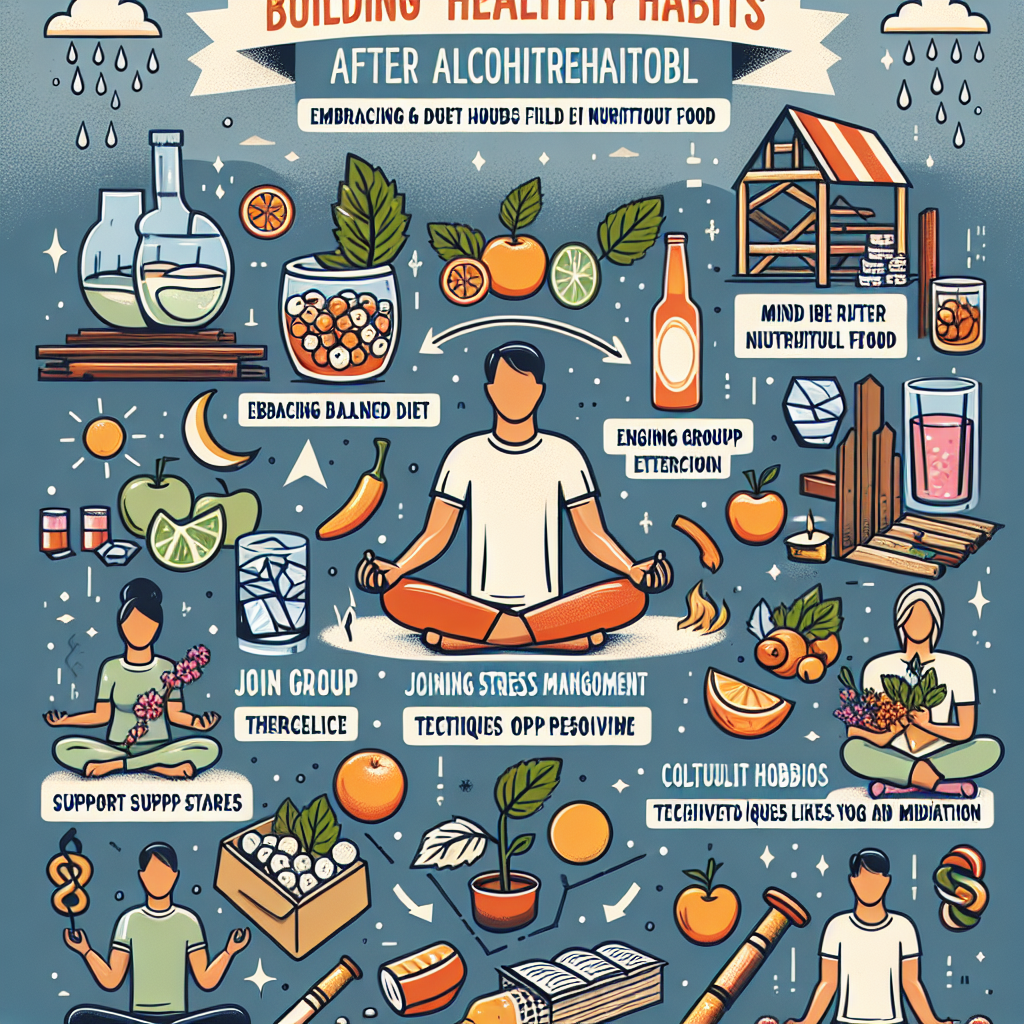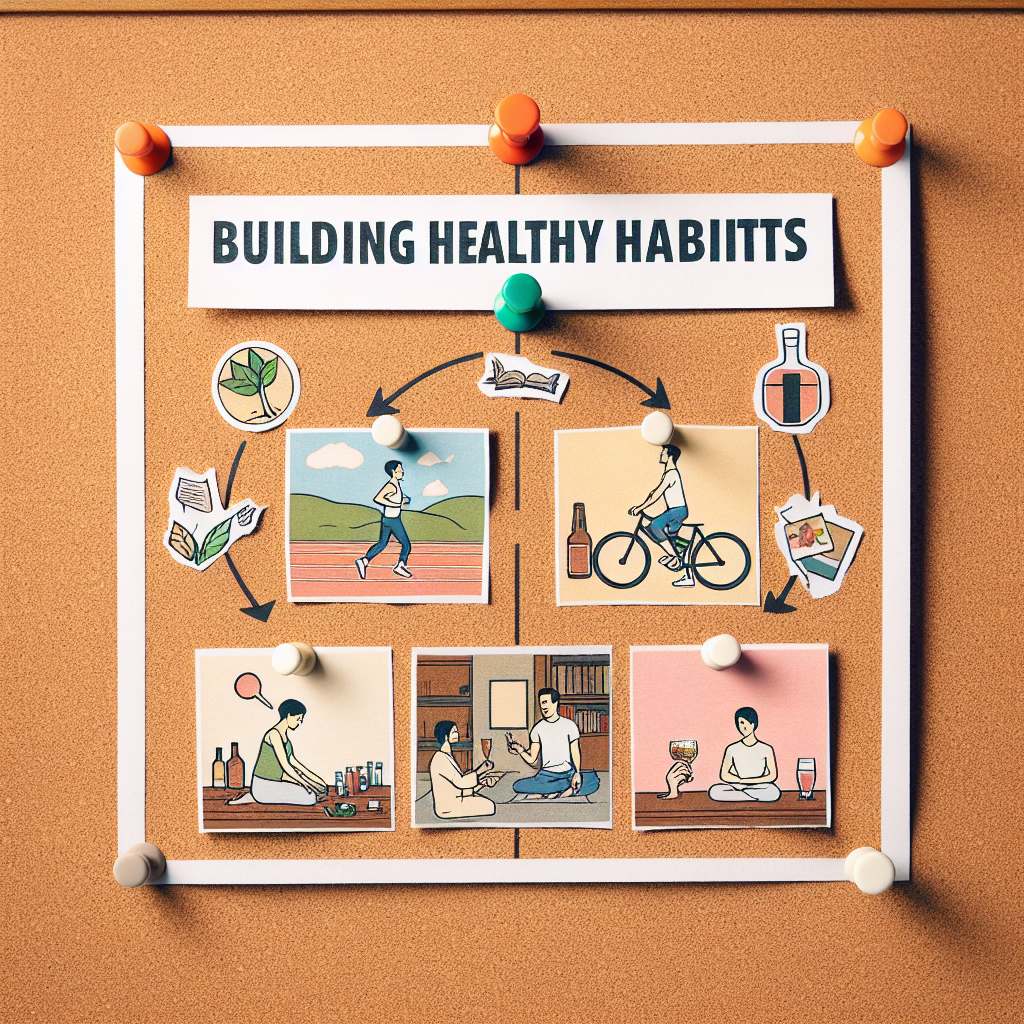-
Table of Contents

“Transform Your Life: Sustainable Habits for Lasting Sobriety”
Introduction
Building healthy habits after alcohol rehab is crucial for maintaining sobriety and improving overall well-being. This process involves creating a structured routine, setting realistic goals, and finding supportive networks. Key strategies include engaging in regular physical activity, adopting a balanced diet, practicing mindfulness and stress management techniques, and seeking ongoing therapy or support groups. By focusing on these areas, individuals can develop a sustainable lifestyle that promotes long-term recovery and personal growth.
Creating a Supportive Environment for Sustained Sobriety
Creating a supportive environment for sustained sobriety is crucial for anyone who has completed alcohol rehab. The journey to recovery is a continuous process that requires dedication, resilience, and a nurturing atmosphere. One of the first steps in building healthy habits post-rehab is to surround yourself with positive influences. This means seeking out friends and family members who understand your journey and are committed to supporting your sobriety. It is essential to communicate openly with them about your needs and boundaries, ensuring they are aware of the triggers and challenges you may face.
In addition to fostering supportive relationships, it is beneficial to engage in activities that promote physical and mental well-being. Regular exercise, for instance, can be a powerful tool in maintaining sobriety. Physical activity releases endorphins, which can improve mood and reduce stress, making it easier to resist the urge to drink. Whether it’s joining a gym, taking up yoga, or simply going for daily walks, incorporating exercise into your routine can have a profound impact on your overall health and sobriety.
Another critical aspect of creating a supportive environment is establishing a structured daily routine. Consistency can provide a sense of stability and purpose, which is particularly important during the early stages of recovery. Start by setting specific goals for each day, such as meal planning, attending support group meetings, or engaging in hobbies that bring you joy. By filling your day with meaningful activities, you reduce the likelihood of boredom or loneliness, which can be triggers for relapse.
Moreover, it is important to create a living space that supports your new lifestyle. This might involve removing any alcohol from your home and replacing it with healthier alternatives like herbal teas or sparkling water. Additionally, consider creating a calming environment by incorporating elements such as plants, soothing music, or aromatherapy. A peaceful and organized living space can significantly contribute to your mental well-being and reinforce your commitment to sobriety.
Engaging in mindfulness practices can also be incredibly beneficial in maintaining sobriety. Techniques such as meditation, deep breathing exercises, and journaling can help you stay grounded and present. These practices encourage self-reflection and emotional regulation, making it easier to navigate the ups and downs of recovery. By dedicating time each day to mindfulness, you can develop a deeper understanding of your emotions and triggers, empowering you to make healthier choices.
Furthermore, seeking professional support can be an invaluable part of your recovery journey. Therapists, counselors, and support groups can provide guidance, accountability, and a sense of community. Regularly attending therapy sessions or support group meetings can help you stay connected with others who understand your experiences and can offer encouragement and advice. These resources can also equip you with coping strategies and tools to handle stress and prevent relapse.
Lastly, it is essential to celebrate your progress and acknowledge your achievements, no matter how small they may seem. Recovery is a challenging journey, and recognizing your successes can boost your confidence and motivation. Whether it’s marking milestones with a special treat or simply taking a moment to reflect on how far you’ve come, celebrating your accomplishments reinforces your commitment to a sober lifestyle.
In conclusion, creating a supportive environment for sustained sobriety involves surrounding yourself with positive influences, engaging in healthy activities, establishing a structured routine, and seeking professional support. By taking these steps, you can build a foundation for long-term recovery and embrace a fulfilling, alcohol-free life.
Developing a Daily Routine to Reinforce Positive Habits
Building healthy habits after alcohol rehab is a crucial step in maintaining long-term sobriety and fostering a fulfilling life. Developing a daily routine can serve as a powerful tool to reinforce positive habits, providing structure and stability during a time of significant change. By integrating purposeful activities into your day, you can create a supportive environment that nurtures your well-being and helps you stay on track.
One of the first steps in establishing a daily routine is to prioritize self-care. This involves paying attention to your physical, emotional, and mental health. Start your day with a morning ritual that sets a positive tone. This could include activities such as meditation, journaling, or a simple stretching routine. These practices can help you center yourself and prepare for the day ahead, fostering a sense of calm and focus.
In addition to self-care, incorporating regular physical exercise into your routine is essential. Exercise not only improves physical health but also has a profound impact on mental well-being. Whether it’s a brisk walk, a yoga session, or a more intense workout, find an activity that you enjoy and can commit to regularly. Exercise releases endorphins, which can elevate your mood and reduce stress, making it an invaluable component of your daily routine.
Another key aspect of developing a healthy routine is maintaining a balanced diet. Proper nutrition plays a significant role in overall health and can influence your energy levels and mood. Plan your meals to include a variety of fruits, vegetables, lean proteins, and whole grains. Staying hydrated is equally important, so make sure to drink plenty of water throughout the day. By nourishing your body with the right foods, you can support your recovery and enhance your overall well-being.
Moreover, setting aside time for hobbies and interests can greatly contribute to a positive routine. Engaging in activities that bring you joy and fulfillment can provide a sense of purpose and help you stay motivated. Whether it’s painting, gardening, reading, or playing a musical instrument, find something that you are passionate about and make it a regular part of your day. These activities can serve as healthy distractions and offer a constructive outlet for your energy and creativity.
Equally important is the need to establish a support network. Surrounding yourself with positive influences and people who understand your journey can make a significant difference. Attend support group meetings, connect with a sponsor, or simply spend time with friends and family who encourage your sobriety. Building strong relationships can provide emotional support and accountability, helping you stay committed to your new lifestyle.
Furthermore, setting realistic goals and celebrating your achievements can reinforce positive habits. Break down your long-term goals into smaller, manageable steps and track your progress. Celebrate each milestone, no matter how small, as it can boost your confidence and motivation. This practice not only helps you stay focused but also reminds you of how far you have come in your recovery journey.
Lastly, practicing mindfulness and gratitude can enhance your daily routine. Take a few moments each day to reflect on the things you are grateful for and acknowledge your progress. Mindfulness practices, such as deep breathing exercises or mindful walking, can help you stay present and reduce anxiety. By cultivating a positive mindset, you can navigate challenges with greater resilience and maintain a sense of inner peace.
In conclusion, developing a daily routine to reinforce positive habits after alcohol rehab is a multifaceted process that requires dedication and intentionality. By prioritizing self-care, incorporating exercise, maintaining a balanced diet, engaging in hobbies, building a support network, setting goals, and practicing mindfulness, you can create a structured and supportive environment that promotes long-term sobriety and overall well-being. Embrace this journey with an open heart and a determined spirit, knowing that each step you take brings you closer to a healthier and more fulfilling life.
Q&A
1. **Question:** What is one effective strategy for building healthy habits after alcohol rehab?
**Answer:** One effective strategy is to establish a structured daily routine that includes regular exercise, balanced meals, and sufficient sleep to promote physical and mental well-being.
2. **Question:** How can social support contribute to building healthy habits after alcohol rehab?
**Answer:** Social support from friends, family, or support groups can provide encouragement, accountability, and a sense of community, which are crucial for maintaining sobriety and building healthy habits.
Conclusion
Building healthy habits after alcohol rehab involves several key steps:
1. **Establish a Routine**: Create a structured daily schedule to provide stability and reduce the risk of relapse.
2. **Set Realistic Goals**: Define achievable short-term and long-term goals to maintain motivation and track progress.
3. **Stay Active**: Incorporate regular physical exercise to improve physical health and reduce stress.
4. **Healthy Diet**: Focus on balanced nutrition to support overall well-being and recovery.
5. **Seek Support**: Engage in support groups, therapy, or counseling to maintain emotional health and receive encouragement.
6. **Avoid Triggers**: Identify and steer clear of situations, people, or environments that may trigger the urge to drink.
7. **Mindfulness and Relaxation**: Practice mindfulness, meditation, or other relaxation techniques to manage stress and emotional challenges.
8. **Hobbies and Interests**: Develop new hobbies or revisit old ones to fill time constructively and find joy in sober activities.
9. **Education and Skills**: Pursue educational opportunities or skill-building activities to enhance personal growth and career prospects.
10. **Regular Check-ups**: Maintain regular medical and psychological check-ups to monitor health and address any emerging issues promptly.
By integrating these strategies, individuals can build a strong foundation for a healthy, fulfilling life post-rehab.



